
April, 2017
Some parents compare the diagnosis of SEN for their children to being thrusted a bomb unprepared – no one can explain why or tell them how to go on. They can only hold onto the bomb with surreal calmness and keep waiting…
Smiling through the Storm
Mrs Daisy Lam
Weaving a safety net for companions
Love V Act, Support Group for SEN parents in Ma On Shan
Distilling Moments of Growing Up
"Special Dad, Special Son"
Besides weary waiting, what else can parents, the comrades-in-arms of their children, do to cheer their families on after such a gruelling start?
Mrs. Lam and her son, nicknamed AA by his mother, had gone through dark but incredibly amazing times together.
As days go by, AA has passed away from brain cancer for almost ten years. As Mrs. Lam recalls, her youngest son was a "smart, handsome, adorable" boy and his only weakness was not being able to write.
It was in the 90s, when dyslexia was still foreign to many people. At an education lecture, AA's dad came across the fact that some people had trouble with writing despite normal intelligence. Not until then could his family make sense of his situation.
"My most unforgettable moment with AA happened when a fundraising program by The Community Chest was introducing various groups of beneficiaries, including mentally handicapped persons. He was in Primary 1 and asked, 'What does mental handicap mean?' I didn't pay much attention at that point, so I just explained to him that mentally handicapped persons were born to be slower learners than normal people. They tend to have more difficulties with learning than others even when they tried very hard. You needed to be helpful and kind when you met anyone like that in school."
"Oh, I see, I am actually mentally handicapped." AA's response stabbed a dagger into her heart, "I kept denying but my tears were streaming down".
 Instead of wearing a long face, why not embrace your children with a huge smile? Mrs. Lam wants parents to remember, "Only you can offer your children happiness."
Instead of wearing a long face, why not embrace your children with a huge smile? Mrs. Lam wants parents to remember, "Only you can offer your children happiness."
Hong Kong had no assessment tools for learning disabilities back in those days and parents could only rely on themselves. After drying all the tears, Mrs. Lam began to form the first and foremost belief of being a parent of a SEN child. "Hope is not lost due to an SEN diagnosis. SEN does not kill your children and if you work hard enough, you can lead your children further and better."
Looking for therapy and catching up with homework are not everything. "Homework is school work so leaves it to teachers. Parents often devote too much attention to things that do not necessarily need them as much. Our most important tasks are to bring happiness to our children, inspire them to cherish their lives, explore their potentials, and identify their life goals. This is what I have come to realise."
Not a minute in AA's life of seventeen years was wasted. He often travelled to other countries with his parents and elder brother and hiked with his family every weekend. After school, mum always took the brothers to the park downstairs for a quick recharge before returning home for homework.
Mrs. Lam had her own strategies even for the most difficult tasks for parents of dyslexic children, including dictation and reading.
"Every time when we were preparing for dictation, I would ask, 'how many marks do you want to get this time?' Come to me if you want full marks. If you want a more relaxing week and getting a pass is good enough, then go to dad. Having a choice is the most crucial part in studies."
AA seemed to be rather enthusiastic about the TV adaptation of The Return of the Condor Heroes. Mrs. Lam seized the chance to offer him a relevant book Heroines by Jin Yong. At first, AA took a look and dismissed because it was too wordy. She then sat next to him and read it out loud. "He found the book more and more interesting, so ended up reading it himself and finished the other one on Jin Yong's heroes."
Everything has a strategy and the learning journey of SEN children, in particular, requires parents to participate. However, it does not mean tutoring at home around the clock. Be their reinforcement, stand by their side all the time, and show them through life.
"As parents, you need to let your children know that you are always there for them, always ready to help them."
From supporting her children to reinforcing many other SEN children, AA has always been Mrs Lam's utmost driving force.
In retrospect, AA indicated his interests in studying abroad like his brother at the age of ten. Mrs. Lam, as his close companion, also had to enrol in a course for herself. AA suggested when she was still on the fence, "Isn't it crystal clear? Of course you should study something about special learning disabilities and help people like me!"
Sadly, their trip was called off by the onset of brain cancer. The silver lining was that it prompted Mrs. Lam to plunge into the field. Since then, she has been serving parents and children with dyslexia, intellectual giftedness, autism, attention deficit disorder. Years have passed since AA's departure, she remains just as devoted to supporting them.
One of her main projects is the scholarship scheme for students with special education needs or chronic illnesses. Past recipients include children who have braved hyperactivity disorder, autism, blindness, and other chronic illnesses. They all hold firmly onto their dreams and never yield to challenges throughout the obstacle race. On AA's birthday every year, the couple organises an award ceremony to root for other children and parents.
As it says on the scholarship website, "Our mission is to channel our memories of AA into a momentum of help, through which we can always feel him with us."
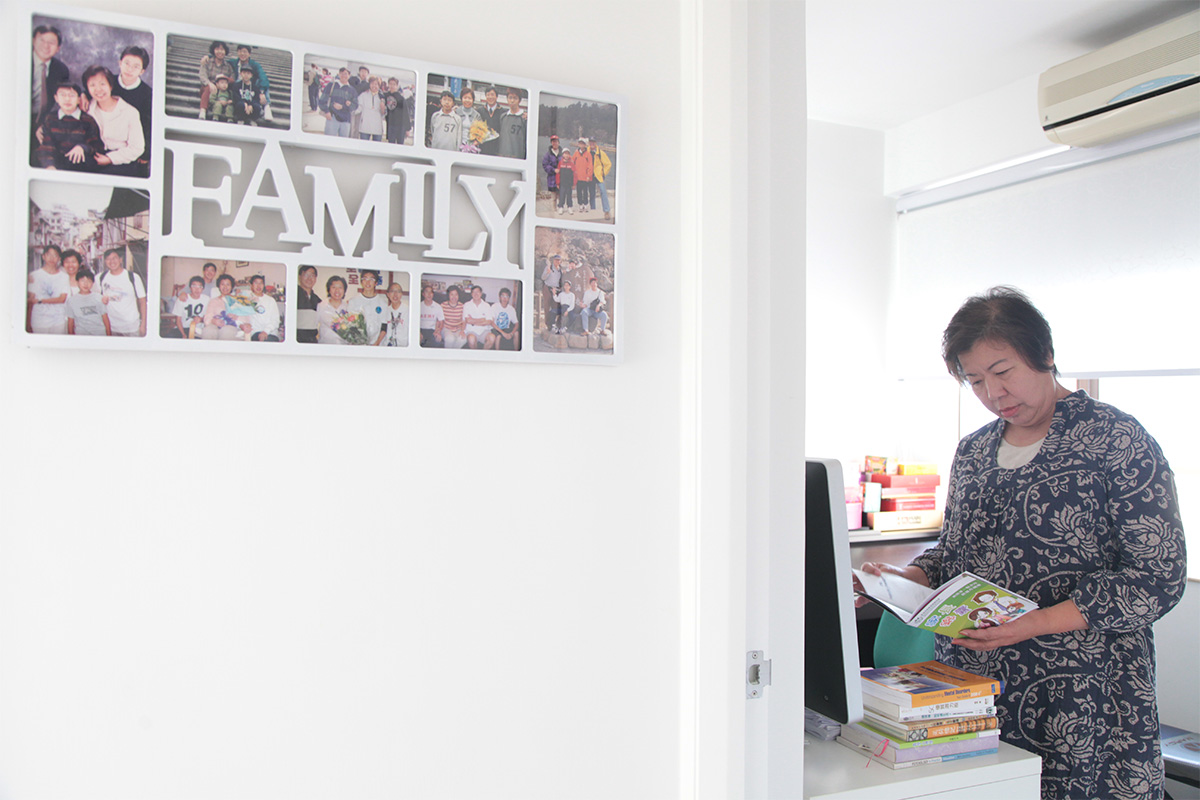 Photos of AA travelling with his family fill the wall at the end of the corridor. Mrs. Lam offers a warm reminder to all parents – cherish every moment with your children and never cease to bring them happiness.
Photos of AA travelling with his family fill the wall at the end of the corridor. Mrs. Lam offers a warm reminder to all parents – cherish every moment with your children and never cease to bring them happiness.
Every year, Mrs. Lam is always touched to see children receive their award on stage. Some dyslexic children use pictures to improve memory or read newspapers daily to brush up pronunciation. A child devises his own reward plan and treats himself with sweets during revision to ensure absolute focus on his homework. He is aspired to be a chef, so that he will not only be able to feed himself, but also take care of his mother with delicious food.
These children remind her of AA. No matter how hard things got, he stayed vigilant and cheerful every step of the way. "His brain cancer relapsed a few times. Despite countless sessions of treatment, he insisted on attending school and going to church and continued with what he found meaningful."
Mrs. Lam is always full of words of praise for her darling son.
"Few years ago, we were notified by an awardee's parents that the boy had passed away. At his funeral, they told us that the scholarship was the happiest thing ever happened to him. He finally knew that all efforts would pay off and impress others in the end. His parents were very grateful of the fond memory we brought to their child before he died."
Every single child desires to be recognised. AA was lucky. His heart was filled with joy and compliments before he left the world. Yet, a lot of SEN children have never had a taste of applause. "I have never been praised before," say many scholarship recipients.
Mrs. Lam says, "Parents often claim that their children are good at nothing but video games. Well, this is one thing to be proud of too! At least he knows about it and you don't."
Leaving suppositions behind is the first lesson of appreciation.
"The father of one case was a professional and his eldest son was a law student and his youngest son was autistic. He firmly believed that his small boy could rise to the top of the ladder one day. He refused to let go of his high expectations and has struggled with his son on studying for over twenty years. Such suppositions are straining. Adjust your expectations and motivate your child with reasonable targets. Make our children happy is what we, as parents, are obliged to do."
More importantly, parents should be aware of the fact that therapy training can be acquired by joining the queue at the centre; unlimited supply of happiness can only be offered by parents.
"Please seize every moment with your children and make them happy."
Mrs. Lam, who has endured the loss of her beloved son, speaks from the bottom of her heart.
Shortly after AA's departure, Mrs. Lam made a promise on the letter she wrote to her late son. "Every time when I am responsible for public lectures, mommy always misses your ideas. Every time when I try to understand the minds of children or opinions of teenagers, you put me into perspective… AA, mommy will carry on with your always helpful attitude and offer as much help as possible to those in need. You wanted mommy to devote more attention to care for children with dyslexia – I promise I will try my very best."
AA up above may not have imagined, but all parents, whether their children have SEN or not, can be benefited from his mother's words of wisdom.
"My son was a typical 'McDull' in class, like a piece of furniture in his kindergarten. He was a very quiet boy who could hold a toy and keep the same posture for all day. He was diagnosed autism at two and a half years old, so I quit my social worker job to be a full-time mum for him. When he got into primary school, I met a group of like-minded parents, so I started the Love V Act group in hopes of expanding the social circle for my son. Initially, the group was not only meant for SEN children but the word of mouth got more and more people together and the rest is history."
"McDull"'s mother Ivy started out by knitting a social network for her son. After having spent nights and days with her son, she gradually lost herself and vanished among the crowd. Her realisation reflects the withdrawal experienced by many SEN parents, who also find their own lives engulfed by their children's disorders.
It is a long, long road, full of thorns and spikes. Ivy understands that, to be a reliable guardian for her child, she must first steady herself and stand firm in the wind and rain.
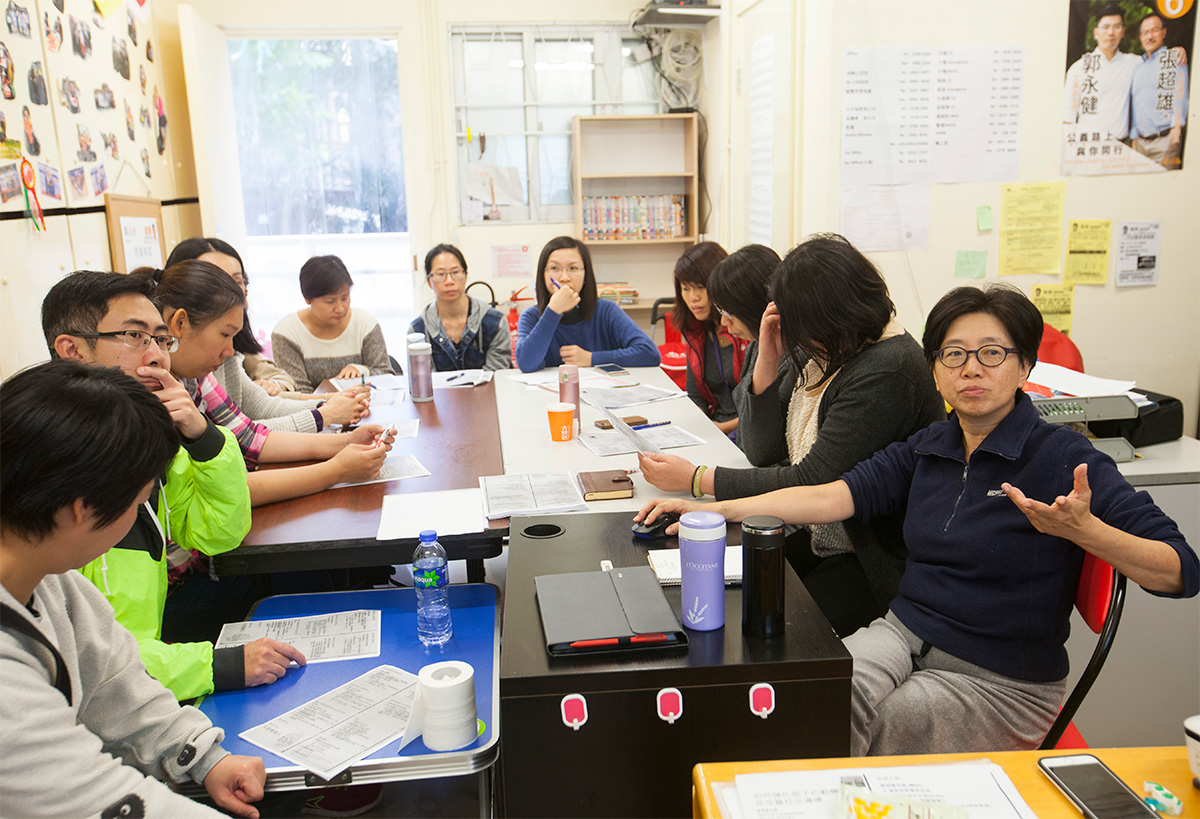 "Love V Act" has gathered over a hundred parents to date, most of whom live in Ma On Shan. Apart from looking out for each other, they hang out a lot too, like they will pick up their children from school together after today's meeting.
"Love V Act" has gathered over a hundred parents to date, most of whom live in Ma On Shan. Apart from looking out for each other, they hang out a lot too, like they will pick up their children from school together after today's meeting.
"Every parent has his/her own strengths, whether it is stringing beads, DIY fragrances, or taking hiking tours. They are most welcome to share their hobbies with the rest of the group. When you have got something else on the side, your attention will no longer be held solely by your children."
Another mother in the group Jo Jo says, "I have joined quite a number of support groups for SEN parents before. Most of them, clouded by an air of despair, had exhausted every possible way to get their children back to 'normal'. Many boys were taking the drugs for AD/HD and their mums were on antidepressants. The feistier ones took even more than others... As for here, we have got a group of outcasts who insist on accompanying our children with love and tolerance."
Love makes everything so much better.
One winter morning before Lunar New Year, few dozens of parents in the group gathered in a secondary school's dance room in Ma On Shan. Under Mil's guidance, they got a taste of the basic skills of focusing – a type of counselling that has helped Mil through her darkest times.
Most SEN parents are or going to be experiencing what Mil has struggled through – some issues are now history, some are still hovering. Her social work profession and maternal instincts have already told her of her son's abnormality. Her worries were, however, dismissed by experts. Categorised as "indocile", her son were caught in scenes of dispute all day, such as being told off by other family members, bullied by peers. Mil, who was said to be an incompetent mum, was flung into a dark abyss of agony and vulnerability, all on her own.
Incapable of understanding their son, the couple's divergences in parenthood has almost costed their marriage. Fortunately, Mil had a chance to learn about focusing. She was hoping it could help her with her relationship with mother but turned out, to her pleasant surprise, it also managed to mend her relationship with her husband.
During the second term in K3, her son had the fortune to meet a very attentive paediatrician, whom referred him to the Department of Health for assessment. Her son was diagnosed autistic symptoms, attention deficit disorder, and severe speech and language impairment. His diagnosis came at the age of seven, which has missed the golden period of SEN therapy.
I remained in perplexity for days following the diagnosis and had no idea how long we have to wait for the services. I was emptied of every spirit and energy. I was thrusted a bomb completely unprepared and without any effective assistance. I could only hold onto it patiently while containing the burning anxiety within."
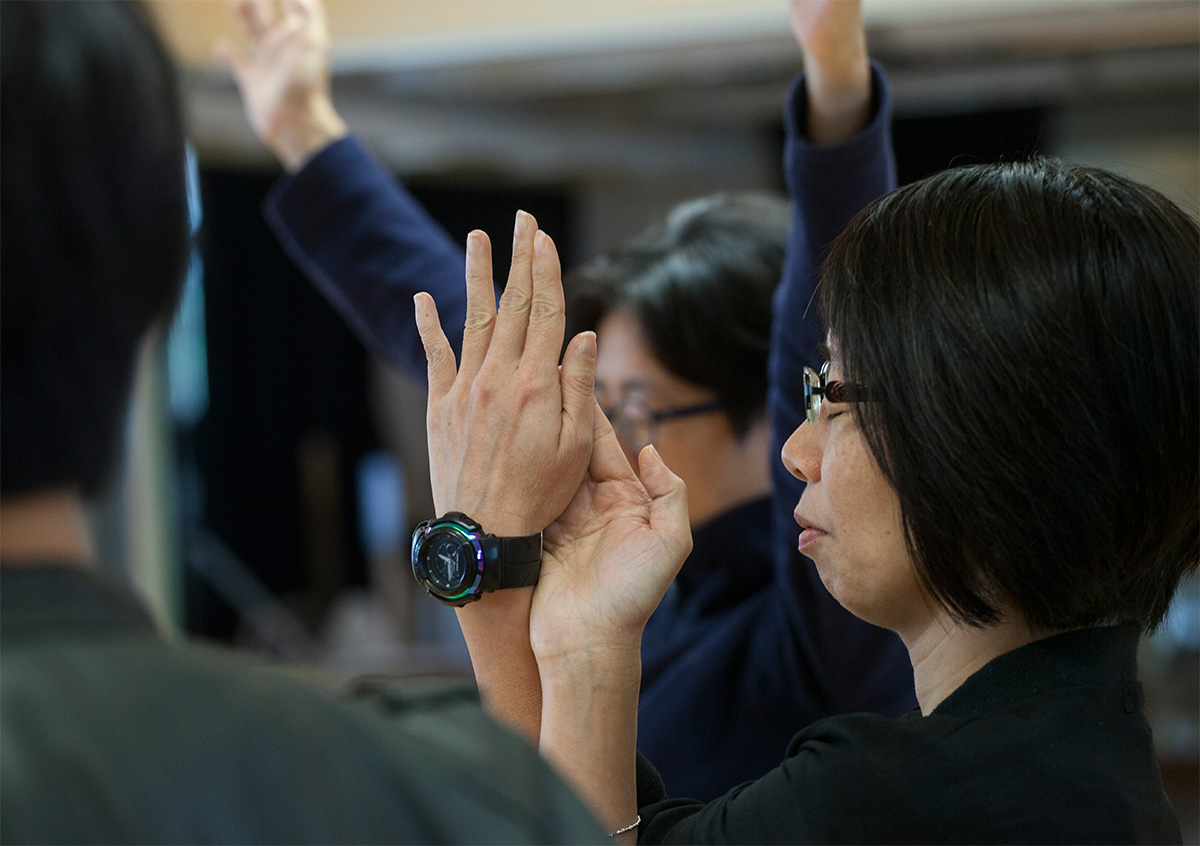 A group of exhausted parents of SEN children find time to gather together and support each other in the spacious dance room. This is also a precious chance for them to listen to others as well as to themselves.
A group of exhausted parents of SEN children find time to gather together and support each other in the spacious dance room. This is also a precious chance for them to listen to others as well as to themselves.
In the well-lit dance room, Mil teaches other parents to relax while sharing her own story. Everyone can find a piece of himself/herself from Mil's experience and, more importantly, see the lights at the end of the claustrophobic tunnel.
"I was walking the path all by myself back then and felt really lonely. Luckily, I met other parents of SEN children and was empowered by the love and strength from them. I used to imagine a lot, in my black hole, how other parents were coping. I am good at counselling, which I hope can be of some help to others.
Mil still has moments of dismal but, by sharing with others in the same boat, finds lights to show her through the long course of life.
The force of empathy is strong and empowering. More than a hundred of parents are closely knitted together because of their shared sense of empathy, which is so generously extended to reach and connect others.
Lack of venue for holding meetings or activities is always the biggest issue for non-governmental organisations. But this group has members who are professionals like social workers, early childhood educators, architects – who are connected to a wealth of material and human resources. They often manage to acquire venues like schools, social welfare institutions or councillor's offices for gatherings and invite experts in different fields for pro-bono sharing sessions. I participated one today, where Jo Jo and Michelle talked about their application of Applied Behaviour Analysis (ABA) on their own children.
They are no experts because they only had one course on ABA; but their experience of bringing up SEN children is certainly good enough to rally attention from a room full of parents in the same boat. Jo Jo and Michelle both have adolescent children now. Young mums from all walks of life come to the session with the same goal – they want to bring home some tips so as to better cope with their straining struggles with children.
"Students of international school swear a lot…" "He hits his head on the wall when he is cranky."
Plights encountered by young parents are nothing new to veterans. Mil and Ivy may even grab the opportunity to offer counselling on the spot. Mil jokes, "Seize the chance! When she fails to receive a response after asking the question once or twice, she may become hopeless and assume nothing can be done to change."
Only those who have experienced it can understand. "Saying 'be more open-minded' is not good enough to console parents. In fact, we often blame ourselves before anyone else when we are upset, 'why can't I be more open-minded?'"
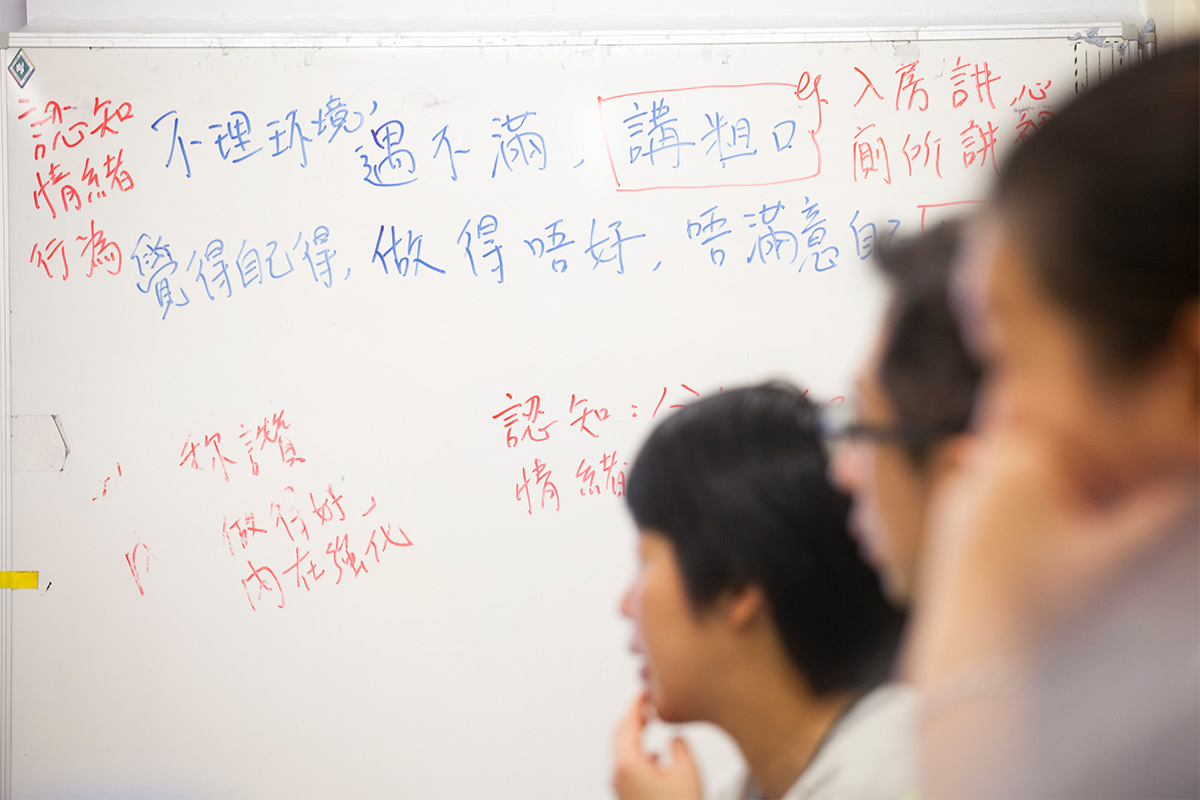 The whiteboard maps out some of the behavioural issues of SEN children, which have been experienced by many parents. Like a support team of the Trailwalker, they get together to offer spiritual and practical support for young parents.
The whiteboard maps out some of the behavioural issues of SEN children, which have been experienced by many parents. Like a support team of the Trailwalker, they get together to offer spiritual and practical support for young parents.
Macro changes make young parents' lives even more difficult. Ivy says, "SEN children need to endure greater pressure nowadays. The higher the expectation, the higher the demand for resources. I spent eleven months queueing up for Heep Hong Society's service, but now it takes around fourteen to eighteen months. Parents always need to try every way imaginable before they can secure resources."
One of the many ways is a "shortcut" paved by predecessors. The support group has two WhatsApp groups. One is for event registration; the other is as all-encompassing as Google search engine – just type in any question regarding resource acquisition and there is always someone ready to shed light and show the way.
"We don't want any parents to walk the long, windy path, like we did. We hope to offer them a shortcut so that their issues can be handled as quickly as possible."
"We want them to take their eyes off children's weaknesses and look ahead."
"We have been there before, so we know that it's just a phase. However arduous it seems, the present is merely a transition. Do not get yourself into a blind alley. Back in the days of struggle, I found acceptance from other parents and I am sure new parents can find that too."
So said the parents who have been there.
They all wish to see more of this kind of group. Ivy hopes, "How nice would that be if each district has a support group for SEN parents?" Resources are limited. Why not start spinning a web of network and embark on a smoother, brighter road paved by predecessors? Both parents and children will find it a lot easier than just sit and wait.
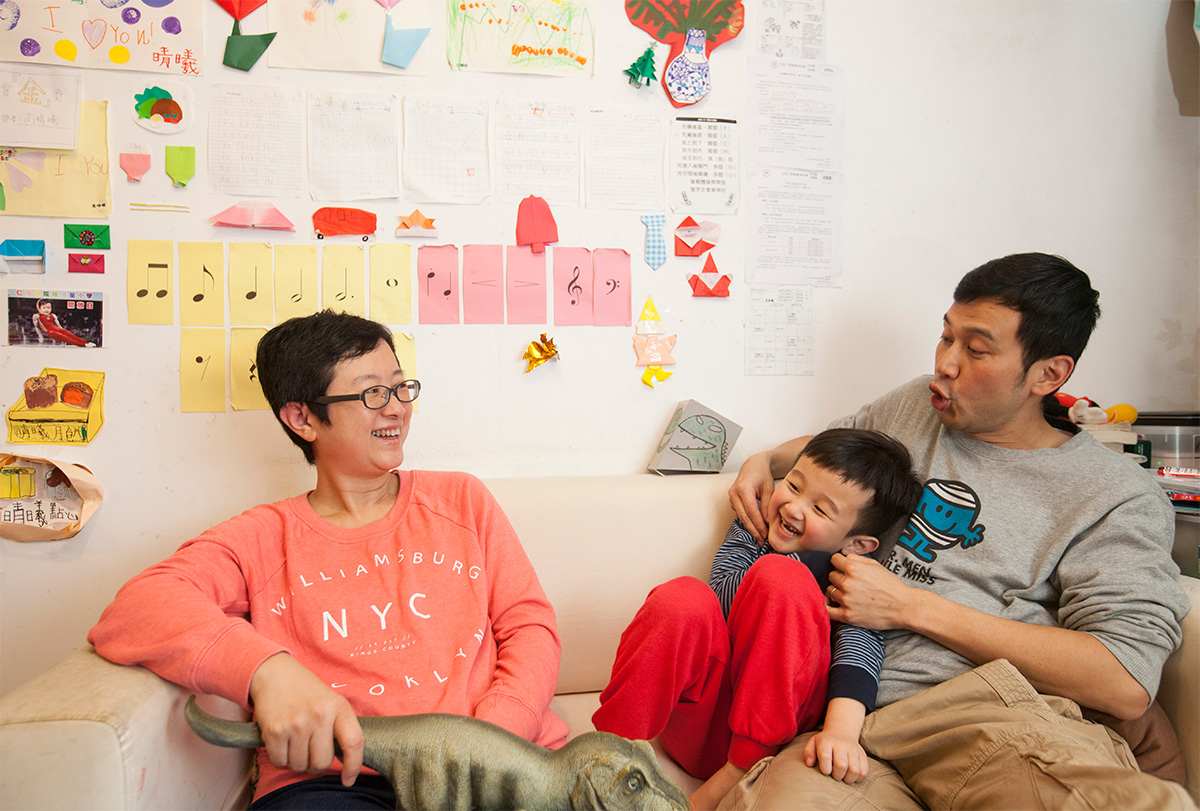
"He could not say anything apart from 'huh…huh…huh…' at first and it took him a long time to utter his first word. We pieced fragments of phases together to constitute complete sentences…"
Many parents would find these scenarios rather familiar, but Ahko managed to take a closer look – Hei Hei was diagnosed autistic disorder at the age of two. He uttered his first word when he was two years old and nine months and became better with verbal communication when he was three and four. Ahko says, "Progress is a whole slow-going process, so slow that it's ideal for appreciation, moment by moment. His efforts are beautiful."
The beauty of slowness requires an appreciative heart. Ahko started to get a hang of it rather early on but his wife Denise took a little bit longer.
Denise confesses, "When my son was first referred as autistic, I was raged because that person was 'talking rubbish and out of her mind.' After having scoured through the internet for all sorts of information pertinent to autism, Denise recalled how Hei Hei liked to spin in circles, refused eye contact, and responded in delay when he was small…those were all symptoms of autism. She instantly flashed forward to the year when Hei Hei would reach eighteen, which brought her a nervous breakdown – "He won't be able to find a job for sure!" The next morning, she went through her son's old photos again with bleary eyes. She felt absurd, "He was a completely normal child yesterday, but he is an autistic patient today – why couldn't I notice anything beforehand?" All emotions were meshed into a dark, giant cloud in her head, blocking any sense of logic or reason.
On the night Denise lost her mind in front of the computer alone, Ahko watched Hei Hei sleep in the bedroom. "In fact, I thought the opposite. I had fun with him yesterday and I will still have fun with him today. It is just a diagnostic jargon," says Ahko.
Opposites make a good team – the optimistic dad and the pessimistic mum balance each other perfectly. Ahko says, "I am unrealistically optimistic sometimes and when I let my imagination go too far, Denise will bring me back. She is more prudent but sometimes too pessimistic, which will be my turn to lead her out." Denise adds, "Mutual trust is very important. Bring all difficulties to the table, talk them through, reach consensus and adhere to the direction."
In her lowest times, Denise found it hard even to get out of the house. "My son couldn't sit still. Once he ran into someone on the MTR, whom then frowned on him. I knew my son did not mean to and I also sensed how unfriendly some people were – so many people in the world were not affectionate to children. It gave me very mixed feelings." Ahko taught her to calm down, "He analysed that the guy was long gone but I brought his anger back home – could it possibly serve a reminder that I was not as accepting of our son as I had thought?"
"Accept your child" may sound a matter of course, but parents often overlook the fact that reaching acceptance is a process, often a bumpy ride full of obstacles. Denise says, "I told myself, from the very first day, that I had to accept him regardless of circumstances. But it might just be a slogan at that point. I spent a long time, went through a lot of struggles before I could be certain that I have truly accepted him."
Ahko adapted Denise, who was still walking the long, dark tunnel, into one of his cartoon characters. In his drawings, the mother is pushing a baby stroller angrily and her mind is overwhelmed by questions – Why is the world so unfair? Why do I have to make so much effort when so many other children are free from this hassle? Why…?
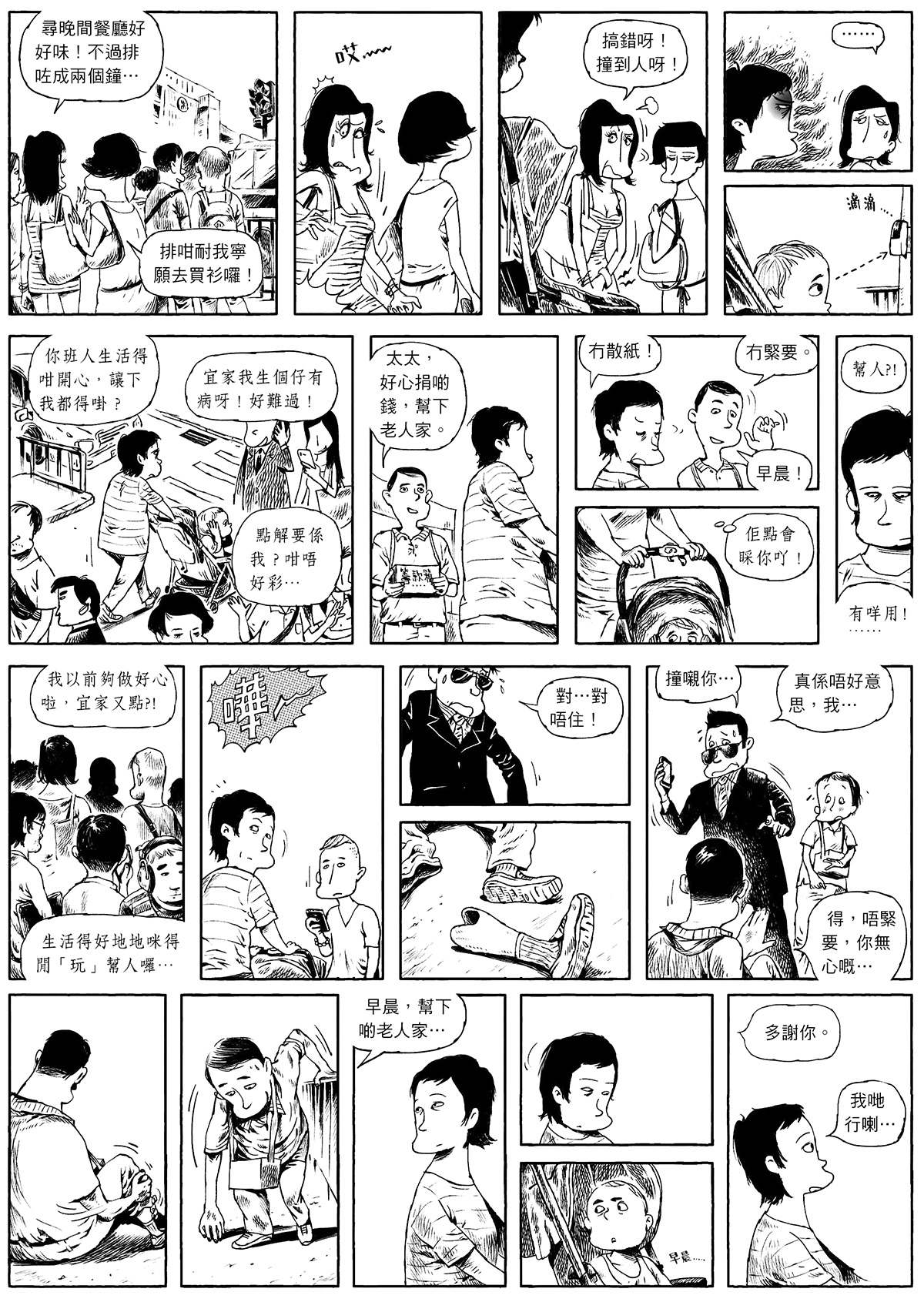 "Absent-minded" drawn by Ahko
"Absent-minded" drawn by Ahko
Ahko says, "I am not sure if this cartoon can help readers to be more understanding. She had a very hard time right after our son's diagnosis and might have given unreasonable responses. She felt offended even when she bumped into others. If she was greeted by an understanding, smiley face back then, would she have felt better?
Denise also received support at Heep Hong Society. She was not confident in taking her son to the playground because she could not restrain him from rushing around. She grumbled it out to a social worker, who offered her a suggestion in return. Denise gathered herself with huge courage to try it out and she made it! The social worker broke into happy tears after knowing her success. "The social worker did not suggest any magic trick, but she gave me comfort. I was touched by having someone so understanding and taking my trivial complains serious." Denise did not tear up back then; but when she recalls it now, she cannot help but choke up a bit.
Before Hei Hei could really articulate himself, he found it difficult to express and got cranky when he failed to. They needed to travel from Tseung Kwan O to Chai Wan for school every day. During the long trip, Hei Hei was often struck by panic and might even start small fights with his parents. Ahko would then take out a pencil and paper and started drawing…
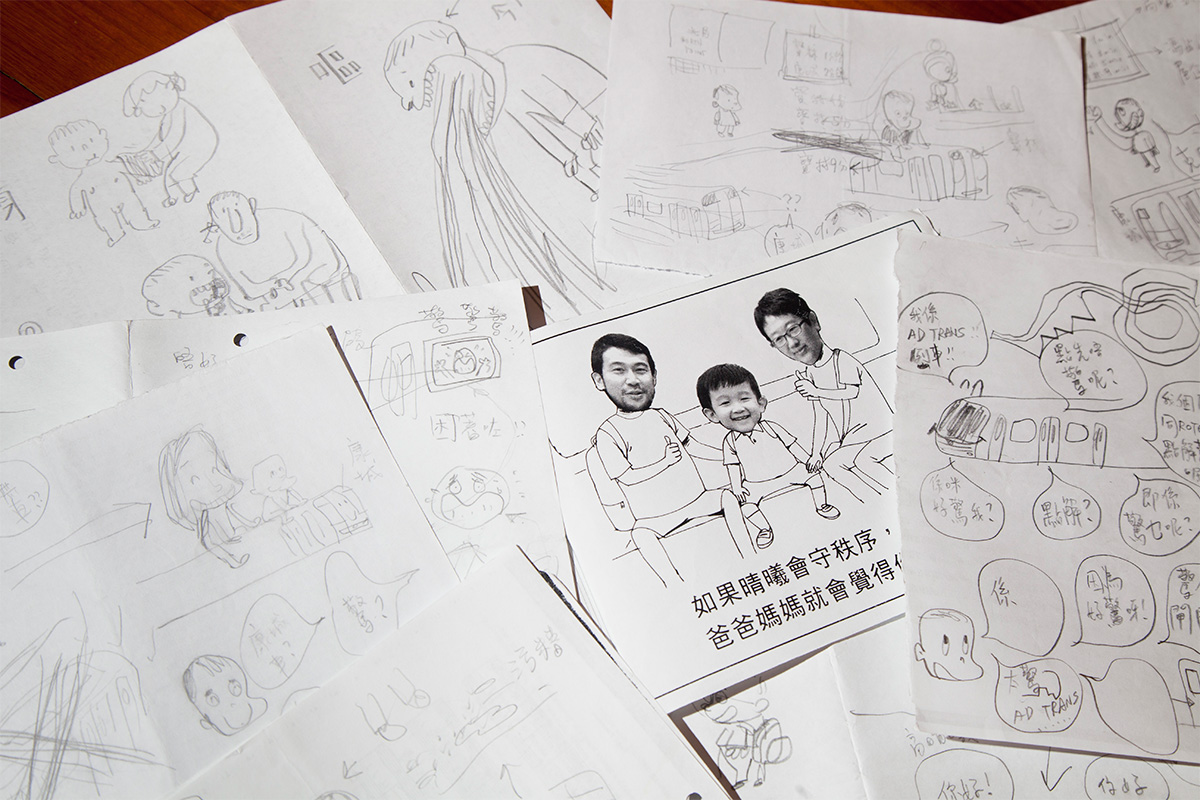 The sketches are a daddy's experiments – experiments on how to communicate with a magical mind.
The sketches are a daddy's experiments – experiments on how to communicate with a magical mind.
Ahko has kept a pile of sketches. They may look rough and unorganised, but they are a father's record of his determination to communicate with his son's magical mind.
"I cannot just ask what he is afraid of; I need to ask while drawing – 'Because of this? Like this?' I learn about visual cues from Heep Hong Society. Hei Hei always reads them carefully. If I stop drawing, he will stop responding. I have been drawing for more than a few decades and it is, by far, the most useful application." The cartoonist dad jokes.
Unravelling problems needs great patience and is not always fruitful. They eventually discover that their son is particularly afraid of a type of train with a louder door-closing warning; but they still cannot figure out why he is always so scared of any train going to Lohas Park that he needs to hide every time.
Ahko creates tailor-made cartoons for Hei Hei's lessons of daily life. One of them reflects frankly on his improper behaviours on MTR – What would you do when all the seats in the train are occupied? Of course you cannot be cranky with other passengers! Ahko sticks profile photos of his family on the cartoon so that Hei Hei can better identify with the story.
When Hei Hei turned three, four years old, Ahko could finally communicate with him verbally. "I was very thrilled and felt fulfilled, like the moment I had been waiting for so long has finally come true. It was also an epiphany – I finally knew how talking to my son felt like."
Since then, the couple get to know Hei Hei better – the little chap, with a freedom-loving spirit, equated schooling to disciplinary training, which he found distressing. Once he asked, "What if the whole world stops following rules?" He burst in laughter after asking. Ahko understood him, "It was not exactly a question. He wanted it to happen so that everyone could play together. That's why he found it funny. Sometimes I find it rather unfortunate or cruel even that he anticipates a world that will never happen and is constantly being dragged back to reality by us."
One day when Akho picked up Hei Hei from school, his teacher was surprised, "Hei Hei talks to his dad a lot!" Ahko later shared on Facebook, "It proves that I can understand you. It's just a matter of patience and time. If communication is not impossible, then others can do it too. How much we really connect with people is often out of our hands. You may be annoyed by it as you grow up, but at least when you tell me, I would know what you are talking about – it's not rocket science.
So here is a dad who wants to be his son's best friend for life.
 Secret talk between father and son
Secret talk between father and son
Growing up with an SEN child is a training in itself – training parents to become their better self. Denise says, "I am a rather evident example. If Hei Hei were not a SEN child, I would be a monster mum. I would force him to tick all the boxes on the list of social expectations. Now I am not under such pressure, which is even better. I have been supported by many people along the way and have also learnt to trust, trust the good faith and kind intentions of others."
By translating his experience into cartoons, Ahko has one wish – readers can open up their minds and become more tolerant.
"Some parents find the cartoons very soothing and that they can understand their children better, which I think is awesome. I have also straightened things out for myself through drawing. I hope that, by the time I am more capable and thorough, I can do more to facilitate better understanding for family with SEN children. In fact, small gestures like avoid criticising any children who flip out in public can already make things easier for others. Can my cartoons be of some help by bringing good faith into the light?"
Parents, especially parents of SEN children, are always more than ready to back up their children – anytime, anywhere, anything. Most of them have spent days scouring through online like crazy, trying every possible way to acquire resources, dashing between institutions for school application.
When we run around like a headless chicken for our children, most of us tend to overlook one major thing – the feelings and needs of children.
What does the little child want the most at this moment? What does he/she need? SEN children are capable of communication, but they may not be good at articulating themselves or can get cranky easily, especially when they are confiding with their closest friends – their parents.
Last Christmas, we talked to Andy, a 21-year-old with high-functioning autism, and his parents about his growing up and his dreams. He was happy to share and even recorded a short clip for parents on how to understand and help children like him. Few days after the recording, Andy returned to Cambridge for college.

June, 2017
We all have special needs – I with lactose intolerance can have no milk in their coffee; you with mysophobia find a dusty office unbearable; people suffering from severe hay fever find fragrances repellent…... Better understanding springs more tolerance which leads our way to a happier and fairer inclusive society.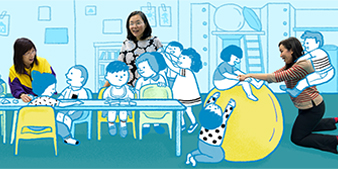
February, 2017
Growing up is an arduous adventure, but the journey is clouded by even more uncertainties after diagnosis of SEN – new faces yet to be acquainted with, new titles that sound confusing more than clarifying…how is a special education preschool teacher different from a regular teacher? Why does the speech therapist keep playing toys with my child? What does a child need occupational therapist for? When should we consult an educational psychologist...?
December, 2016
"Mum, dad, have you noticed that your kid is slightly different from other children…"We have complied different kinds of social resources for your reference, including those provided or subvented by the government, non-subvented self-financing ones, as well as mutual/self-help efforts.
Details